Investing in the funds is a suitable option for busy individuals with limited stock market knowledge, as it offers lower risk and is managed by experienced professionals.

While many Vietnamese investors are currently favouring self-directed stock investments, an increasing number of investors are choosing fund certificates as an approach to balance opportunities and risks.
Investment fund certificates represent securities that confirm an investor's ownership of a portion of the fund's capital or ownership rights to a portion of the assets held by the fund.
Rather than purchasing separate stocks, investors contribute to the fund, allowing the fund management company to create a diversified portfolio. Investing in the funds is a suitable option for busy individuals with limited stock market knowledge, as it offers lower risk and is managed by experienced professionals.
While investment performance may vary, securities investment funds in Việt Nam generally yield better returns than savings interest rates in the long run.
These funds usually maintain a high equity ratio over a long period, although they can be temporarily affected by market volatility.
On the other hand, retail investors and non-professional entities in the domestic stock market often have a short-term mindset and react swiftly.
As a result, during market upswings, they may achieve superior investment performance compared to investment funds. This preference leads many investors in Việt Nam to favour self-directed investing.
Moreover, regulations set by the State Securities Commission (SSC) limit a stock's share in a fund to 20 per cent, ensuring risk diversification.
Stringent criteria are applied when selecting stocks for fund portfolios, while funds are required to deposit their funds in reputable and independent banks, separate from the fund management company.
These banks act as custodians, monitoring investment activities to ensure compliance with regulations and the company's charter.
Investing in open-ended funds may result in lower profits compared to investing in individual securities. However, it offers long-term effectiveness and mitigates risks such as liquidity and capital loss through diversification, Lương Thị Mỹ Hạnh, Head of Domestic Asset Management at Dragon Capital VietFund Management, told tinnhanhchungkhoan.vn.
Nguyễn Thành Trung, CEO of Kim Group, a Hà Nội-based investment company, said that major stock investors in the Vietnamese market are non-professionals. While they may experience profits during market growth, they often suffer losses during downturns.
Unlike investment funds that follow strict criteria and long-term goals, retail investors lack comprehensive knowledge of economic operations and market dynamics, enabling them to make informed decisions unaffected by short-term fluctuations.
"It is evident that fund portfolios show strong resilience during market downturns and achieve an average annual profit of over 20 per cent,” Trung said.
“While there are retail investors who achieve impressive returns, averaging 30-40 per cent per year, they are few in number and approach investing as a dedicated and determined profession.”
Nguyễn Mai Hương, an investor in Hà Nội, began learning about fund certificates in early 2023. She has allocated about VNĐ500 million (US$20,167.8) from her investment budget to these certificates.
In 2023, most funds performed well, yielding a return of around 26 per cent for Hương after deducting management fees.
This outperformed the average market growth with a 12 per cent increase in the benchmark VN-Index and was five times higher than the 12-month savings interest rate.
With nearly ten years of experience investing in the stock market, she prefers investing in stocks on stock exchanges for the potential higher profits compared to fund certificates.
However, she acknowledges the risk of profits turning into losses if the timing is not optimal. Allocating a portion of her investment to fund certificates allows her to diversify her investment opportunities and potentially achieve a minimum return of 10 per cent, surpassing traditional savings rates of 4-5 per cent.
The investor also said that she prioritises reputable fund certificates in the market. She acknowledges that the investment effectiveness of these funds depends on stock market trends, so there is a certain level of risk involved. However, Hương expects the risk to be average or lower compared to the general market volatility.
This year, many funds even anticipate reaching a 20 per cent investment return. — VNS





